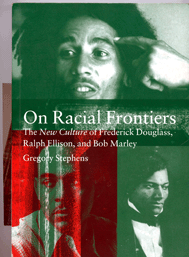|
Intermix.org.uk is a website for the benefit
of mixed-race families, individuals and anyone who feels they have a multiracial
identity and want to join us. Our mission is to offer a view of the mixed-race experience, highlighting icons, film, books, poetry, parenting techniques, celebrities, real lives and much more. Our online forums are a great place to meet others, ask questions, voice your opinions and keep in touch. Sign up for our monthly newsletter and delve into our pages. Want to join in? Become an Intermix member to take part: |
On Racial Frontiers - Gregory Stephens
 The New Culture of Frederick Douglass, Ralph Ellison and Bob Marley
The New Culture of Frederick Douglass, Ralph Ellison and Bob Marley
Cambridge University Press, 1999
Price £14.95
ISBN 0-521-64393-7
A book that makes a serious attempt to connect the life and thought of three such apparently diverse mixed-race 'stars'
already deserves recognition for the sheer scope of its ambition. If you want to know more about Frederick Douglass
(nineteenth century abolition campaigner), Ralph Ellison (writer of the classic American novel Invisible Man) or
Bob Marley (reggae genius of the Wailers) then this is a fine introduction to key aspects of each. The triumph of
Stephens, though, is that he manages to create something much more than an unusual triple biography:
he succeeds in producing nothing short of a new philosophy of 'race' in the modern West or, rather, of its potential
non-existence.
Stephens departs from a fascinating and well-argued theoretical premise that there has been a systematic psychological
repression of mixed-race people's existence in modern Western society despite their very 'obvious' reality; as a result,
we, even in the enlightened twenty-first century, find it impossible to conceive of 'mixed-ness' totally and utterly
free of the black/white' discursive framework. Even when that 'mixed-ness' stares us in the face with its refusal to
conform to the rules of 'race' as a clear-cut classifying system of human difference, Stephens suggests that this
artificial and man-made racial matrix is all but impossible to think outside of: our very beings are trapped by its rules.
In revolutionary opposition to this, though, are the work and legends of Douglass, Ellison and Marley.
These three stand, the book argues, as the ultimate hidden representatives of an 'interracial consciousness',
positioned at the borders of all racial labels. Usually claimed as unproblematical 'black' figureheads of
oppositional politics, Stephens here insists that we reclaim the 'mixedness' of their legacy. This leads us
to perceive a more accurate vision of the struggle painted in their speeches, books and songs: we see that
is a struggle built not on a fixed model of racial identity but rather on a mosaic of constantly shifting discourses,
territories and cultures. Through the carefully orchestrated hybridity of them and their art, 'blackness' stops being
something the reader/spectator can easily pin down, and instead radically destabilises the very foundations upon which
our notion of 'race' rests.
If all this sounds a little dry and intellectual, rest assured that all these deeply significant philosophical
insights come illustrated through lively and compelling discussions of some of the most beautiful literature
and song lyrics of the twentieth century. (It is good indeed to see Marley's work getting the literary analysis
it deserves.) An academic and yet effortlessly unpretentious series of essays, they can (and should) be read by
anyone frustrated by the limitations of the stereotypes forced on us by conventional racialized thinking. This
book offers dynamic inspiration for how to re-write and re-define our reality on our own terms.
Book Review by Andrew Asibong.
Have you read this book? Why not let us know your thoughts.
Click here to join the Intermix Forums:
